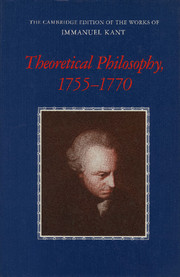Book contents
- Frontmatter
- Contents
- General editors' preface
- Preface
- Guide to abbreviations
- General introduction
- Introductions to the translations
- Résumés of the works
- A NEW ELUCIDATION OF THE FIRST PRINCIPLES OF METAPHYSICAL COGNITION (1755)
- THE EMPLOYMENT IN NATURAL PHILOSOPHY OF METAPHYSICS COMBINED WITH GEOMETRY, OF WHICH SAMPLE I CONTAINS THE PHYSICAL MONADOLOGY (1756)
- AN ATTEMPT AT SOME REFLECTIONS ON OPTIMISM (1759)
- THE FALSE SUBTLETY OF THE FOUR SYLLOGISTIC FIGURES (1762)
- THE ONLY POSSIBLE ARGUMENT IN SUPPORT OF A DEMONSTRATION OF THE EXISTENCE OF GOD (1763)
- Preface
- Section 1 In which is furnished the argument in support of a demonstration of the existence of God
- Section 2 Concerning the extensive usefulness peculiar to this mode of proof in particular
- Section 3 In which it is shown that there is no other possible argument in support of a demonstration of the existence of God save that which has been adduced
- ATTEMPT TO INTRODUCE THE CONCEPT OF NEGATIVE MAGNITUDES INTO PHILOSOPHY (1763)
- INQUIRY CONCERNING THE DISTINCTNESS OF THE PRINCIPLES OF NATURAL THEOLOGY AND MORALITY (1764)
- M. IMMANUEL KANT'S ANNOUNCEMENT OF THE PROGRAMME OF HIS LECTURES FOR THE WINTER SEMESTER 1765 — 1766 (1765)
- DREAMS OF A SPIRIT-SEER ELUCIDATED BY DREAMS OF METAPHYSICS (1766)
- CONCERNING THE ULTIMATE GROUND OF THE DIFFERENTIATION OF DIRECTIONS IN SPACE (1768)
- ON THE FORM AND PRINCIPLES OF THE SENSIBLE AND THE INTELLIGIBLE WORLD [INAUGURAL DISSERTATION] (1770)
- Factual notes
- Bibliographies of editions and translations
- Glossary
- Biographical-bibliographical sketches of persons mentioned by Kant
- Index
Preface
Published online by Cambridge University Press: 18 December 2014
- Frontmatter
- Contents
- General editors' preface
- Preface
- Guide to abbreviations
- General introduction
- Introductions to the translations
- Résumés of the works
- A NEW ELUCIDATION OF THE FIRST PRINCIPLES OF METAPHYSICAL COGNITION (1755)
- THE EMPLOYMENT IN NATURAL PHILOSOPHY OF METAPHYSICS COMBINED WITH GEOMETRY, OF WHICH SAMPLE I CONTAINS THE PHYSICAL MONADOLOGY (1756)
- AN ATTEMPT AT SOME REFLECTIONS ON OPTIMISM (1759)
- THE FALSE SUBTLETY OF THE FOUR SYLLOGISTIC FIGURES (1762)
- THE ONLY POSSIBLE ARGUMENT IN SUPPORT OF A DEMONSTRATION OF THE EXISTENCE OF GOD (1763)
- Preface
- Section 1 In which is furnished the argument in support of a demonstration of the existence of God
- Section 2 Concerning the extensive usefulness peculiar to this mode of proof in particular
- Section 3 In which it is shown that there is no other possible argument in support of a demonstration of the existence of God save that which has been adduced
- ATTEMPT TO INTRODUCE THE CONCEPT OF NEGATIVE MAGNITUDES INTO PHILOSOPHY (1763)
- INQUIRY CONCERNING THE DISTINCTNESS OF THE PRINCIPLES OF NATURAL THEOLOGY AND MORALITY (1764)
- M. IMMANUEL KANT'S ANNOUNCEMENT OF THE PROGRAMME OF HIS LECTURES FOR THE WINTER SEMESTER 1765 — 1766 (1765)
- DREAMS OF A SPIRIT-SEER ELUCIDATED BY DREAMS OF METAPHYSICS (1766)
- CONCERNING THE ULTIMATE GROUND OF THE DIFFERENTIATION OF DIRECTIONS IN SPACE (1768)
- ON THE FORM AND PRINCIPLES OF THE SENSIBLE AND THE INTELLIGIBLE WORLD [INAUGURAL DISSERTATION] (1770)
- Factual notes
- Bibliographies of editions and translations
- Glossary
- Biographical-bibliographical sketches of persons mentioned by Kant
- Index
Summary
Ne mea dona tibi studio disposta fideli, Intellecta prius quam sint, contempta relinquas.
LucretiusI do not esteem the use of an endeavour, such as this present one, so highly as to suppose that the most important of all our cognitions, there is a God, would waver or be imperilled if it were not supported by deep metaphysical investigations. It was not the will of Providence that the insights so necessary to our happiness should depend upon the sophistry of subtle inferences. On the contrary, Providence has directly transmitted these insights to our natural common sense. And, provided that it is not confused by false art, it does not fail to lead us directly to what is true and useful, for we are in extreme need of these two things. Thus, that employment of sound reason, which still lies within the limits of ordinary insights, yields sufficiently convincing proofs of the existence and properties of this Being, though the subtle scholar will everywhere feel the lack of demonstration and of the exactitude of precisely determined concepts and regularly connected syllogisms. Nonetheless, one cannot refrain from searching for this demonstration, in the hope that it may present itself somewhere. For, without mentioning the reasonable desire to achieve, in cognition of such importance, something which is complete and distinctly understood, – and no understanding which is accustomed to investigation can renounce this desire – it is to be hoped that such an insight, once it has been attained, will be able to illuminate much else in this object. To achieve this purpose, however, one must venture the bottomless abyss of metaphysics. Metaphysics is a dark and shoreless ocean, marked by no beacons. One must proceed as the mariner proceeds on an unnavigated sea: as soon as he makes a landing, he subjects his voyage to scrutiny, with a view to determining whether undetected currents, for example, may not have carried him off course, in spite of all the care, prescribed by the art of navigation, which he has taken.
- Type
- Chapter
- Information
- Theoretical Philosophy, 1755–1770 , pp. 111 - 115Publisher: Cambridge University PressPrint publication year: 1992
- 1
- Cited by

